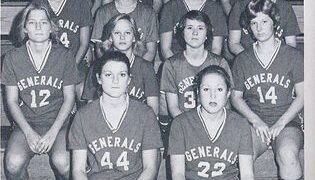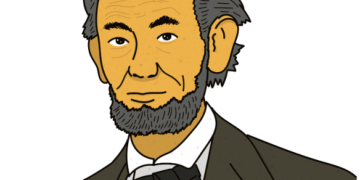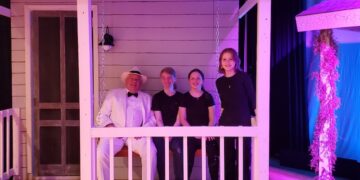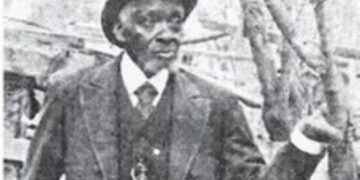
Bausch apparently began to write the novel in Memphis in 2012 and worked on it in various locations through the years, finishing it in Orange, California, in 2021. Having lived in Memphis, he would have been particularly aware of the various theatrical groups in the city, including the historical Orpheum Theatre. He dedicated the novel to his twin daughters, Lisa and Lila, and to the memory of his twin brother Robert of whom he writes, “[He was] always a kind and tough counselor, a completely trustworthy and wise confidant, my lifelong friend and healing presence–a calming, encouraging, cherished companion in sorrows and in laughter, a continual spur in this art, and the sanest man I ever knew.” A remarkable public tribute to a sibling!
Odie Lindsay writes of Bausch’s successful creation of setting in Playhouse, “The city of Memphis – – one social slice of it anyway – – is a stage all its own. Bausch marks it well enough, from Summer to Gayoso Avenue, to dry ribs from The Rendezvous. The geography serves to parody the arts and arts-funding set, as defined by Southern social Codes and genteel benevolence.” Bausch’s Memphis thus presents a different “slice” of the city than that of Tara Stringfellow’s Memphis. In writing the novel, Bausch is also particularly adept in his use of multiple perspectives. He uses third-person narration, but shifts from character to character, skillfully creating the interior sensibilities of each of his them.
Playhouse will certainly resonate with enthusiasts of both theatre and Shakespeare (particularly his major tragedy, King Lear). Bausch features a Memphis theater company in the process of staging a performance of King Lear to celebrate the re-opening of their Globe Theatre, newly financed by two wealthy women, Salina Berrens and Miranda Bland, who own a successful cosmetics business.
Resident actors, like Claudette Bradley, form the core of the company, but new actors are brought in, including an elderly British actor, William Mundy, who has achieved recent success in a Netflix series. He arrives with the arrogance typical of a minor celebrity; his unsavory reputation as a sexual predator also comes with him.
Also new to the company is the temporary director, Rueban H. Frye, who also carries considerable baggage: egotism and unearned professional pride. A talented young local actress, Mona Greer, is cast as Cordelia; her uncle by marriage, Malcolm Ruark also joins the crew. Various complications evolve as the group tries to bring the play to fruition under Frye’s unique idea of presenting Cordelia as a deaf woman who must sign her speeches, then have them vocalized by King Lear’s Fool. The intense summer heat of Memphis adds to the stress of the company.
These theatrical people, however, have lives beyond their work. Bausch includes the family and social issues he always deals with in his fiction. Along with the actors in King Lear, the other main character is Thadeus Deerforth, the theatre manager. Of the main characters, Kirkus Review writes, “Each of them has a troubled marriage–two recently ended, and one looks increasingly shaky.” The shaky one is that of Deerforth and his wife Gina Donato. She, the chief set designer, is going through one of her periodic dark periods while he, at the age of 38, has become obsessed with his health.
Malcolm Ruark’s wife divorced him in the aftermath of a scandal involving her niece Mona Greer, who was only 17 when she and Malcom–both drunk– were involved in an automobile accident. For years Ruark had been a local celebrity as chief anchor at a television station. After the scandal, he lost both is marriage and his job. He has stopped drinking but continues to suffer both shame and an obvious sense of failure.
Claudette Bradley is two years divorced from an unsuccessful fellow actor, Geoffrey Chessman, who remains in a proverbial state of “arrested development.” When their marriage ended, he headed for Hollywood, but, after failing there, he returns to Memphis, drinking and drug-ridden. To add to Claudette’s woes, she has assumed care of her father, who after suffering a stroke, begins to lapse into senility.
To resolve these issues–both theatrical and personal–, Bausch creates a melodramatic ending with semi-positive resolution; however, despite the melodrama , Playhouse offers, in the words of Publishers Weekly, ” a rewarding homage to both literary and human drama.”





























